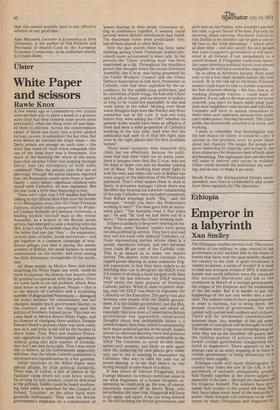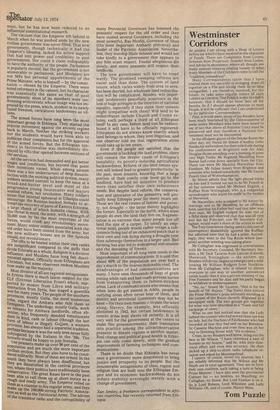Ethiopia
Emperor in a labyrinth
Xan Smiley
The Ethiopian troubles are not over. The recent decision of the military to take control of the government is but another link in the chain of events that have over the past months shaken the country to the core. A quiet revolution, a violent evolution, a series of revolts? It is hard to label and interpret events of 1974. A hideous famine and world inflation were the catalysts that activated discontent and led to the overthrow in March of a corrupt government, the eclipse of the Emperor and the weakening of the old order. But it is harder to put the happenings of the.last two weeks into a nutshell. The soldiers claim to have grasped power in order to buttress, not to bring down, the present structure of government. The new cabinet will contain both soldiers and civilians; There will be 'permanent consultations between them. Any member of the old order suspected of corruption will be brought to trial. The soldiers want a vigorous sweeping away of what they see as the decadent old guard, and the ruthless pursuit of policies which the former civilian government inaugurated but failed to implement. There appears to be a strange case of an army stepping in to force a civilian government to bring democracy to a country more rapidly. Ethiopia could still easily disintegrate. A country four times the size of the UK, it is a patchwork of mutually antagonistic groups held'flimsily together at the centre largely -4 especially in the past — through the charisma 0(.6 the Emperor himself. The soldiers have pro' tested their loyalty to the grand old man, but they have taken away most of the monarchy's power. Haile Selassie will continue to be venerated by many Ethiopians and respected bY
most, but he has now been reduced to an influential constitutional monarch.
The vacuum that the Emperor left behind in March when he was pushed aside by the new civilian government was never filled. That new government, though technically it had the Emperor's blessing, lacked his active support that had lent power and credibility to past governments. Nor could it claim indisputably to have the authority of the people. Parliament is popularly elected, but the government is not answerable to parliament, and Ministers are not MPs but personal appointments of the Prime Minister, who is himself — by the constitution — chosen by the Emperor. There were noted reformers in the cabinet, but its character was essentially the same as that of past governments: most of its members were landowning aristrocrats, whose image was not im proved by the press, which, strident in its newly found freedom, caricatures landowners as villains.
The armed forces have long been the most important group in Ethiopia. They started the Popular movement against the ancient regime back in March. Neither the striking workers nor the students would have been able to publicise their complaints but for the approval of the armed forces. But the Ethiopian tendency to factionalise was immediately dis played by rifts that opened between sections of the services.
All the services had demanded and got better wages and conditions, but beyond that point their intentions varied. While among airmen there was a hot undercurrent of deep dissatisfaction with the existing political system, many soldiers seemed content to keep the issue at a
bread-and-butter level and most of the progressive young lieutenants and majors
wanted reform, not revolution. Many soldiers stress that internal upheaval in Ethiopia could encourage the Russian-backed Somalis to at tempt the recovery of parts of Eastern Ethiopia, a large chunk of which Somalia claims. With this threat in mind, the army, with a strength of 55,000 men by far the most important of the forces, would crush any revolutionary move ment. Many senior soldiers associated with the old order have been ousted from the army, but the new military bosses are in the Spinola mould, not revolutionary. The rifts to be healed within their own ranks are insignificant compared to the gulfs that divide Ethiopia as a whole. Religion is a divisive influence, and Muslims have long felt discriminated against. Officially most Ethiopians are Christian, but some observers reckon Muslims now make up the majority. Most divisive of all are regional antagonisms. In Eritrea there is much latent support for the ELF (Eritrean Liberation Front) which, sup ported by money from Libya and military instruction from Syria, has waged a guerrilla war for many years. The people of the southern provinces, mostly Galla, the most numerous
tribe, regard the Amhara who rule them as foreigners. The underdogs, mostly Galla, work as tenants for Amhara landlords, often absentee, who frequently demand extortionate dues in kind, cash or labour (though the last form of labour is illegal). Gojj am, a western province, has always had a separatist tradition, Perhaps because it was the only area never fully
subjugated by the Italians in the '30s. The Somalis would be happy to join Somalia. The Peasants make up over 90 per cent of the Population and are much the more important civilian section. But they also have to be considered militarily. Most of them are armed. In the south they have always been disaffected, but they are dissatisfied in the central provinces too,'where their politics have traditionally been scinservative. The great Rases have in the past been able to call them up at short notice as a rough and ready army. The Emperor relied on them as a counter to his regular army, and they
make up the 100,000-strong Patriotic Association as well as the Territorial Army. The advent
of the transistor radio and the corruptibility of many Provincial Governors has lessened the peasants' respect for the old order and they have ousted several Governors, including the most powerful, Ras Mesfln, Governor of Shoa (the most important Amharic province) and leader of the Patriotic Association. Nevertheless, they worship Haile Selassie and would not take kindly to a government that appears to pay him scant respect. Feudal allegiances die slowly, and many peasants still respect their landlords.
The new government will have to tread warily. The promised sweeping reforms are easier said than done. The system of land tenure, which varies widely from area to area, has been decried, but wholesale land redistribution will be complicated. Besides, will important landowners peacefully acquiesce in the loss of huge acreages in the interests of national equality, especially if they think their tenants might sympathise with them? Will land to be redistributed include Church and Crown es tates, each perhaps a third of all Ethiopian land? In any case, before land can be redistributed it will have to be officially registered: Ethiopians do not always know exactly which land belongs to whom, they love litigation, and one observer told me that registration alone could take up to ten years.
Even if the people are satisfied that the government is.tackling the land problem, there
will remain the deeper cause of Ethiopia's instability: its poverty-inducing agricultural backwardness. Reform of the land tenure sys tem will indeed lead to greater productivity: in the past, most tenants, knowing that a large portion of their yearly crop must go to the landlord, have had no incentive to produce more than satisfies their own subsistence needs. But despite land reform, the conserva tism and ignorance of the peasantry will pro bably keep Ethiopia poor for many years yet. These are the real causes of famine and pover ty, not drought — the latter rherely highlights the former. Especially in the north, where most people do own the land they live on, fragmen tation is so extreme that many people live off land the size of a carpet. To satisfy an emptional need, people would rather scrape a sub sistence living out of an exhausted patch that is their own and risk dying during a drought year than submerge themselves in a larger unit. Bad farming has also led to widespread soil-erosion and the denuding of forests. Most important of all long-term needs is the improvement of communications. It is said that about 60% of the population are over half a day's march to the nearest motorable road. The disadvantages of bad communications are many. I have seen thousands of bags of grain rotting while rain and bad roads prevent lorries from transporting them to famine-stricken at'eas. Lack of communications also means that when laws do get passed in Addis, people in outlying areas often 'never hear of them, and district and provincial Governors may not be keen — for their own reasons — to pass the word along. Slavery, for example, was officially abolished in 1942, but certain landowners in remote areas kept slaves till recently. It is all very well for the government at the centre to make fine pronouncements: their translation into practice among the ultraconservative peasants in distant regions is another matter. Real change and political good health in Ethiopia can only come slowly, with the gradual improvement of farming techniques and com munications. There is no doubt that Ethiopia has never seen a government more determined to bring justice and prosperity to its people. But the innumerable antagonisms of class, region and religion that are built into the Ethiopian Empire and its economic backwardness do not induce stability overnight merely with a change of government.
Xan Smiley, a freelance correspondent in African countries, has recently returned from Ethiopia



































 Previous page
Previous page